
Harald Tveit Alvestrand is a Norwegian computer scientist. He was chair of the Internet Engineering Task Force (IETF) from 2001 until 2005, succeeding Fred Baker. Within the IETF, Alvestrand was earlier the chair of the Areas for Applications from 1995 until 1997, and of Operations and Management in 1998.
In computer network engineering, an Internet Standard is a normative specification of a technology or methodology applicable to the Internet. Internet Standards are created and published by the Internet Engineering Task Force (IETF). They allow interoperation of hardware and software from different sources which allows internets to function. As the Internet became global, Internet Standards became the lingua franca of worldwide communications.
In computing, the Internet Message Access Protocol (IMAP) is an Internet standard protocol used by email clients to retrieve email messages from a mail server over a TCP/IP connection. IMAP is defined by RFC 9051.

The Internet Engineering Task Force (IETF) is a standards organization for the Internet and is responsible for the technical standards that make up the Internet protocol suite (TCP/IP). It has no formal membership roster or requirements and all its participants are volunteers. Their work is usually funded by employers or other sponsors.
A Request for Comments (RFC) is a publication in a series from the principal technical development and standards-setting bodies for the Internet, most prominently the Internet Engineering Task Force (IETF). An RFC is authored by individuals or groups of engineers and computer scientists in the form of a memorandum describing methods, behaviors, research, or innovations applicable to the working of the Internet and Internet-connected systems. It is submitted either for peer review or to convey new concepts, information, or, occasionally, engineering humor.

The Internet Assigned Numbers Authority (IANA) is a standards organization that oversees global IP address allocation, autonomous system number allocation, root zone management in the Domain Name System (DNS), media types, and other Internet Protocol–related symbols and Internet numbers.
The Internet Architecture Board (IAB) is "a committee of the Internet Engineering Task Force (IETF) and an advisory body of the Internet Society (ISOC). Its responsibilities include architectural oversight of IETF activities, Internet Standards Process oversight and appeal, and the appointment of the Request for Comments (RFC) Editor. The IAB is also responsible for the management of the IETF protocol parameter registries."
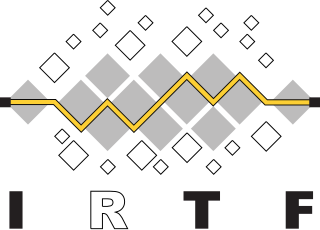
The Internet Research Task Force (IRTF) is an organization, overseen by the Internet Architecture Board, that focuses on longer-term research issues related to the Internet. A parallel organization, the Internet Engineering Task Force (IETF), focuses on the shorter term issues of engineering and standards making.
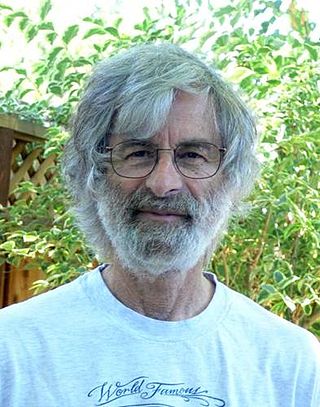
Leslie B. Lamport is an American computer scientist and mathematician. Lamport is best known for his seminal work in distributed systems, and as the initial developer of the document preparation system LaTeX and the author of its first manual.

Paul V. Mockapetris is an American computer scientist and Internet pioneer, who invented the Internet Domain Name System (DNS).
Privacy-Enhanced Mail (PEM) is a de facto file format for storing and sending cryptographic keys, certificates, and other data, based on a set of 1993 IETF standards defining "privacy-enhanced mail." While the original standards were never broadly adopted and were supplanted by PGP and S/MIME, the textual encoding they defined became very popular. The PEM format was eventually formalized by the IETF in RFC 7468.

Peter James Denning is an American computer scientist and writer. He is best known for pioneering work in virtual memory, especially for inventing the working-set model for program behavior, which addressed thrashing in operating systems and became the reference standard for all memory management policies. He is also known for his works on principles of operating systems, operational analysis of queueing network systems, design and implementation of CSNET, the ACM digital library, and codifying the great principles of computing. He has written numerous influential articles and books, including an overview of fundamental computer science principles, computational thinking, and his thoughts on innovation as a set of learnable practices.
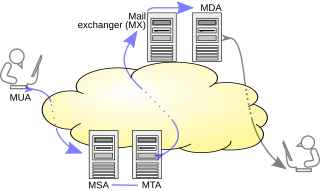
A message submission agent (MSA), or mail submission agent, is a computer program or software agent that receives electronic mail messages from a mail user agent (MUA) and cooperates with a mail transfer agent (MTA) for delivery of the mail. It uses ESMTP, a variant of the Simple Mail Transfer Protocol (SMTP), as specified in RFC 6409.
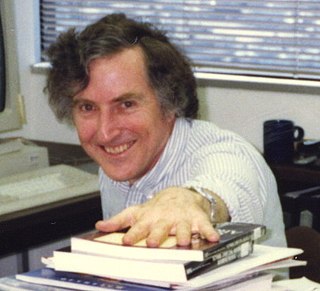
Robert Braden was an American computer scientist who played a role in the development of the Internet. His research interests included end-to-end network protocols, especially in the transport and network layers.
Multipath TCP (MPTCP) is an ongoing effort of the Internet Engineering Task Force's (IETF) Multipath TCP working group, that aims at allowing a Transmission Control Protocol (TCP) connection to use multiple paths to maximize throughput and increase redundancy.
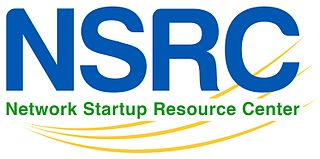
The Network Startup Resource Center (NSRC) is a nonprofit organization, formed in 1992 and based at the University of Oregon. The organization supports deployment of Internet research and education networks in academic institutions and non-governmental organizations throughout the Asia Pacific region, Africa, Latin America and the Caribbean, and the Middle East. NSRC receives major funding and in-kind donations from the National Science Foundation (NSF), Google and Google.org, Cisco, O'Reilly Media, Vint Cerf, the Richard M. Karp Foundation, IDRC, Internet Society (ISOC), and many other institutional and private donors.
Lixia Zhang is the Jonathan B. Postel Professor of Computer Science at the University of California, Los Angeles. Her expertise is in computer networks; she helped found the Internet Engineering Task Force, designed the Resource Reservation Protocol, coined the term "middlebox", and pioneered the development of named data networking.
Murray S. Kucherawy is a computer scientist, mostly known for his work on email standardization and open source software.











